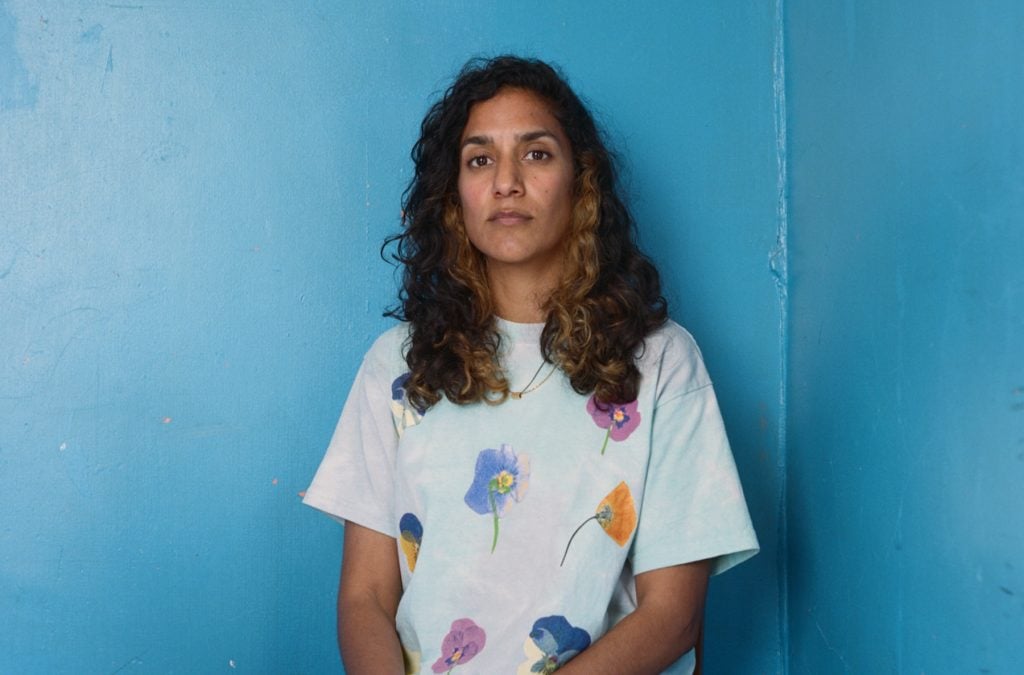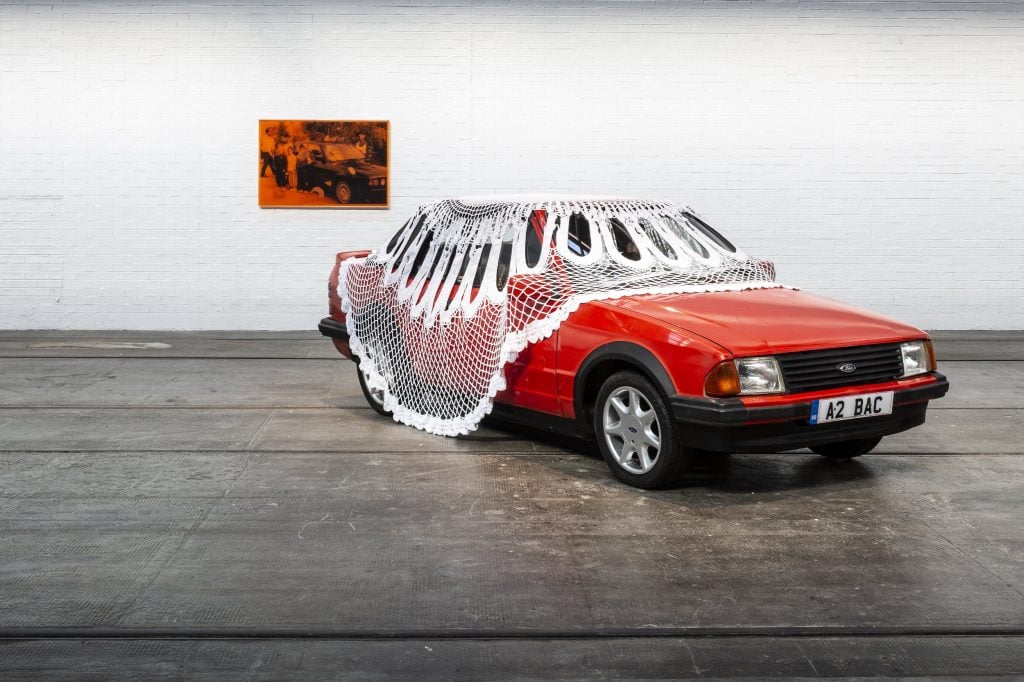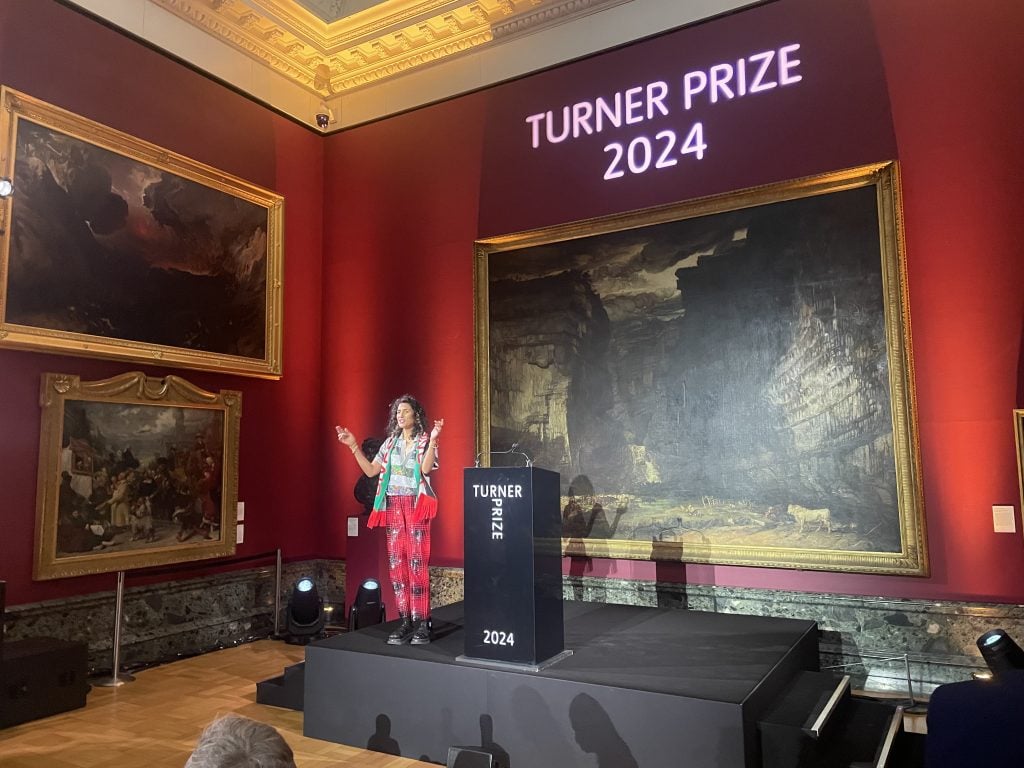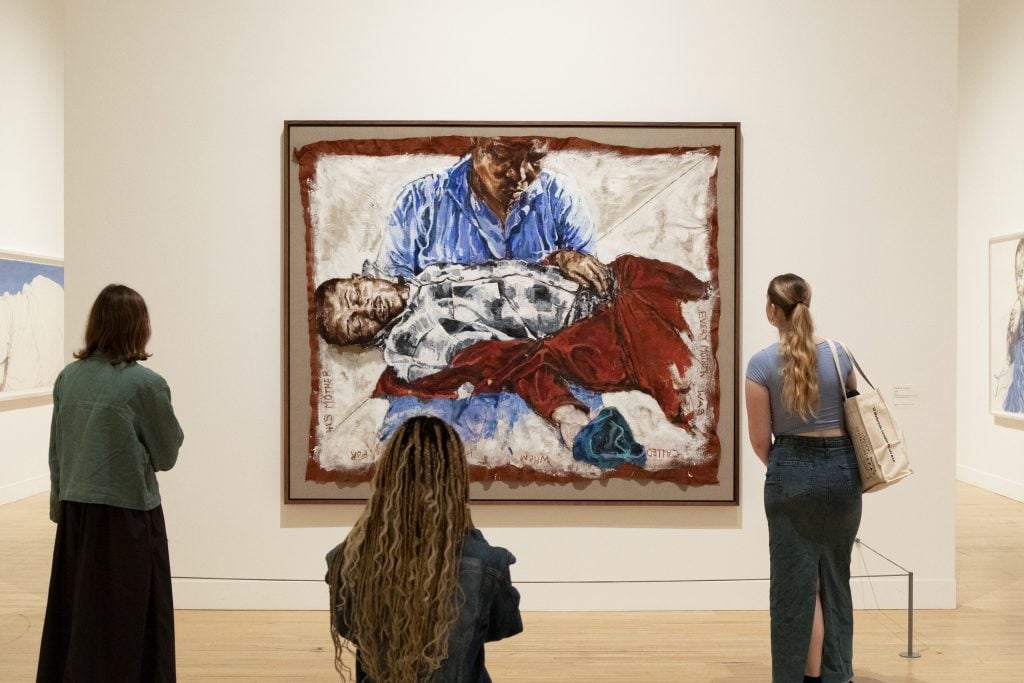Artists
Jasleen Kaur Clinches Turner Prize, the U.K.’s Top Art Honor
The Glasgow-born artist took home $31,000 for her sculptures made of everyday objects that explore identity and cultural memory.

The Glasgow-born artist took home $31,000 for her sculptures made of everyday objects that explore identity and cultural memory.

Vivienne Chow

Jasleen Kaur, celebrated for her semi-autobiographical sculptures crafted from everyday objects, has been awarded the 2024 Turner Prize, the U.K.’s most prestigious contemporary art honor. The news was announced at an award ceremony at Tate Britain in London on Tuesday evening, where the artist called for a ceasefire in Gaza as she accepted the award.
At 38, Kaur is the youngest of this year’s nominees and was a frontrunner to win the £25,000 ($31,000) award. The Glasgow-born artist’s vintage red Ford Escort covered in a giant doily parked squarely in Tate Britain’s galleries is a standout at the Turner Prize exhibition. The work was first shown in “Alter Altar” at Tramway in Glasgow last year, the show for which she was nominated for the award. A reflection of her upbringing in Scotland as the daughter of Indian parents, she described the sculpture as a fusion of her “dad’s first car and his migrant desires.”
Also included are photos from Kaur’s family archive that have been ensconced in Irn-Bru-orange resin along with pieces of torn-up rotis—references to the blessed foods she would receive at Sikh temple, the Gurdwara, which included Scotland’s iconic orange soda. Meanwhile, photos on the floor reveal images of protests against immigration raids on the streets of Glasgow.

Installation view of Jasleen Kaur, Alter Altar at Tramway, Glasgow in 2023. Photo: Keith Hunter, courtesy of Tramway and Glasgow Life.
“I’m interested in the iconography and symbolism in the homes and community spaces I grew up around and how they function as pedagogical tools,” Kaur told Artnet News in September.
In the lead-up to the award ceremony, Kaur was among more than 1,200 artists and art workers to sign an open letter demanding that Tate divest from donors and organizations with ties to Israel and take a “clear stance against the artwashing of genocide and apartheid.” The letter urged the museum to end any existing contracts it has with Barclays and Hewlett-Packard, both targets of the Boycott, Divestment, Sanctions (BDS) movement, and to cut ties with the Outset Contemporary Art Fund, the Zabludowicz Art Trust, and Zabludowicz Art Projects.
At Tate Britain on Tuesday night, around 200 pro-Palestine protesters had gathered outside of the award ceremony, including some counterprotestors.
“I want to echo the calls of the protestors outside,” Kaur said as she accepted the award from actor James Norton. The artist, who wore the colors of the Palestinian flag, added that she wants “the institution to understand that if you want [artists] inside, you need to listen to us outside.”

Jasleen Kaur accepts the Turner Prize at Tate Britain. Photo: Vivienne Chow.
“We need a proper ceasefire now. Free Palestine,” said Kaur, who received a round of applause and cheers as she walked away from the stage.
“Kaur weaves together the personal, political, and spiritual in her exhibition ‘Alter Alter,’ choreographing a visual and aural experience that suggests both solidarity and joy,” this year’s jury said in a statement. Jury members include Rosie Cooper, the director of Wysing Arts Centre; writer, broadcaster, and curator Ekow Eshun; Sam Thorne, the director general and CEO at Japan House London; curator and art historian Lydia Yee; and chair Alex Farquharson, Tate Britain’s director.
They added that they were impressed by how the artist brought together different perspectives in creative and surprising ways, using everyday materials to spotlight moments of strength and hope, transforming seemingly ordinary objects into capsules for cultural memory.
The Turner Prize, presented to an artist born or working in the U.K. for an outstanding exhibition or presentation of their work over the previous year, is considered one of the art world’s top honors. This year marks the 40th anniversary of the award. Runners-up included Pio Abad, Delaine Le Bas, and Claudette Johnson, all of whom will receive £10,000 ($12,500).
The nominated presentations this year share a common theme of identity and history. “All artists have a story to tell and in this year’s Turner prize tales of origin and arrival are crucial,” noted the Guardian‘s critic Adrian Searle.

Installation view, Claudette Johnson’s presentation in the Turner Prize 2024 exhibition at Tate Britain. © Tate Photography, Josh Croll.
An early favorite for the award, Johnson, 64, was nominated for two exhibitions from 2023: “Presence” at the Courtauld Gallery in London and “Drawn Out” at Ortuzar Projects in New York. The portrait painter was part of the BLK Art Group in Wolverhampton in the 1980s but has only recently gained widespread renown after taking a multi-decade break from her practice. The Filipino-born, London-based Abad, 41, explores the legacy of the many cultural artifacts that have been locked away in the store rooms of Western museums or flagrantly mislabelled for decades in his presentation, “To Those Sitting in Darkness.” Le Bas, 59, explores her Roma-Traveller heritage in an immersive, chaotic installation of tapestries and furniture laden with symbology that is as esoteric as it is fun.
Kaur’s work, along with that of the other three nominees, remains on view at Tate Britain through February 16, 2025.
The Turner Prize was founded in 1984 and it has contributed to key debates about contemporary art without shying away from controversies. Many art world titans such as Anish Kapoor, Antony Gormley, Damien Hirst, and Steven McQueen have been recipients of the award. Last year, the award went to sculptor Jesse Darling, who waved a Palestinian flag upon accepting his award.
Next year the prize will be held at Cartwright Hall in Bradford as part of the 2025 U.K. City of Culture celebrations.